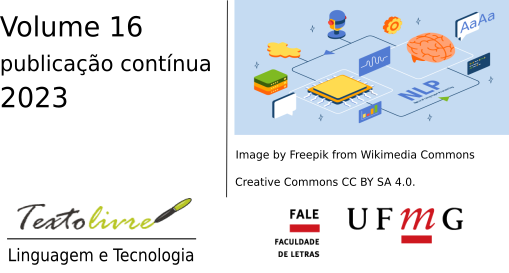Artificial intelligence in education
the challenges of ChatGPT
DOI:
https://doi.org/10.1590/1983-3652.2023.45997Keywords:
Artificial intelligence, Chatbots, Increased intelligence, Philosophy of technology, ChatGPTAbstract
To discuss the impacts of the diffusion of access to language model platforms in education, this study points to methodological and substantive issues around generative Artificial Intelligence (AI) for the field of digital humanities, which has concerned educators, mainly in Higher Education, in situations such as plagiarism, critical development and creativity in contemporary textuality. Thus, the study aims to reflect, based on Andrew Feenberg's Critical Theory of Technology, how AI can be enhanced in the face of the common aversive embarrassment that requires changes. Methodologically, the research is of a qualitative, exploratory nature and the study takes advantage of a bibliographical research, whose inherent contributions to the conception of AI are based on the productions of Kaufman (2022) and Santaella (2021, 2023), which serve as a premise for to relate AI problematizations with Feenberg (2003, 2004) Critical Theory of Technology. Data point to two aspects: the first one that places generative AI as an event to be inhibited by educational institutions, due to the lack of ethical regulations; and the other that suggests to enhance the use of these products with a critical purpose, in the perspective of increased intelligence. In short, the study points out that generative AI is a field that lacks regulations, but that can be conducted collectively, mainly within Higher Education Institutions, which have the potential to discuss these issues critically and with the possibility of social action effect, to consider technology a way of life.
Downloads
References
BALTAR, Ronaldo. Professores serão substituı́dos pela inteligência artificial? Newsletters: LinkedIn Corporation, 2023.
BAUMAN, Zygmunt. A cultura no mundo lı́quido moderno. Rio de Janeiro: Zahar, 2013.
COECKELBERGH, Mark. AI ethics. Cambridge: MIT Press, 2020.
DE MORAES, João Antônio; MATILHA, Adriano. Todo poderoso GPT. Revista Humanitas, n. 162, p. 20–30, 2013.
DIJCK, José van. In data we trust? The implications of datafication for social monitoring. Matrizes, v. 11, n. 1, p. 39–59, abr. 2017. ISSN 1982-8160. DOI: 10.11606/issn.1982-8160.v11i1p39-59. Disponível em: https://www.revistas.usp.br/matrizes/article/view/131620. Acesso em: 1 set. 2023.
FEENBERG, Andrew. O que é filosofia da tecnologia. Tradução: Agustín Apaza. Conferência realizada para os estudantes universitários de Komaba em junho de 2003, sob o título de “What is Philosophy of Technology?”: [s.n.], 2003. Disponível em: https://www.sfu.ca/~andrewf/Feenberg_OQueEFilosofiaDaTecnologia.pdf. Acesso em: 25 mar. 2023.
FEENBERG, Andrew. Teoria Crítica da Tecnologia. Colóquio Internacional Teoria Crítica e Educação, Unimep, Ufscar, Unesp, 2004. Disponível em: https://www.sfu.ca/~andrewf/critport.pdf. Acesso em: 25 mar. 2023.
GOOGLE. Visualizador de livros Ngram. Disponível em: https://books.google.com/ngrams/. Acesso em: 1 mar. 2023.
KAUFMAN, Dora. Um projeto de futuro. Piauí, 2021. Disponível em: https://bit.ly/36SUw6S. Acesso em: 27 jul. 2023.
KAUFMAN, Dora. Desmistificando a inteligência artificial. Belo Horizonte: Autêntica, 2022.
LÉVY, Pierre. As tecnologias da inteligência: o futuro do pensamento na era da informática. Rio de Janeiro: Editora 34, 1993.
MACLEAN, Ian. A discourse on the method of correctly conducting one’s reason and seeking truth in the sciences – Rene Descartes. New York: Oxford University Press, 2006.
MARQUES, Fabrício. O plágio encoberto em textos do ChatGPT. Pesquisa Fapesp, n. 326, p. 40–41, 2023. Disponível em: https://revistapesquisa.fapesp.br/o-plagio-encoberto-em-textos-do-chatgpt/. Acesso em: 20 jul. 2023.
MASSAROO, João Carlos; MESQUITA, Dario (Ed.). Produção de Conteúdo: audiovisual multiplataforma. São Paulo: Soul, 2020.
NINIS, Alessandra Bortoni et al. O mito da neutralidade da ciência. In: NEDER, Ricardo T. (Ed.). Teoria crítica da tecnologia: experiências brasileiras. Brasília: Observatório do Movimento pela Tecnologia Social na América Latina. UnB/Capes-Escola de Altos Estudos, 2013. p. 15–28.
RIBAS, Marcos. Aprendizagem e Inteligência na obra “Cibernética e Sociedade”, de Norbert Wiener. Linguagens, Tecnologias e pós-humanismo/ humanidades, Unicamp, 2020. Disponível em: https://www2.iel.unicamp.br/litpos/2020/06/12/aprendizagem-e-inteligencia-na-obra-cibernetica-e-sociedade-de-norbert-wiener/. Acesso em: 2 abr. 2023.
SANTAELLA, Lucia. Humanos hiper-hı́bridos: linguagens e cultura na segunda era da internet. São Paulo: Paulus, 2021.
SANTAELLA, Lucia. A inteligência artificial é inteligente? São Paulo: Almedina, 2023.
Downloads
Published
Issue
Section
License
Copyright (c) 2023 Karoline Santos Rodrigues, Olira Saraiva Rodrigues

This work is licensed under a Creative Commons Attribution 4.0 International License.
This is an open access article that allows unrestricted use, distribution and reproduction in any medium as long as the original article is properly cited.











